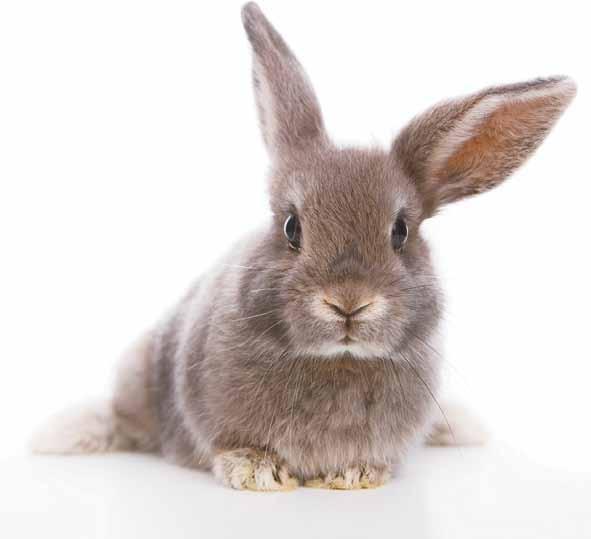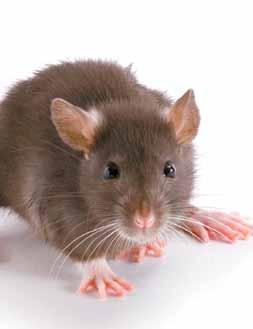
4 minute read
natural pet
Big Love From Small Animals
the Joy of Furry Little companions
Advertisement
by Julie Peterson
People think rabbits are quiet carrot-munchers, but they’re much more. Like many other small furry mammals, pet rabbits are expressive, intelligent and enjoy spending time with their humans.
Shana Cobin, a veterinary technician from Foster, Rhode Island, points out that just like dogs and cats, each rabbit is unique. Having had four house bunnies at different times, Cobin enjoyed getting to know each one. “They can be quite entertaining with their playful antics. My first rabbit, Koko, would come to me and lick my face,” says Cobin. “She also made a purring sound for me, which they actually make by grinding their teeth.”

Small and Sweet
For first-time pet owners, veterinarians often recommend pets smaller than dogs or cats. These can include a variety of rodents such as hamsters, gerbils, rats and mice, although guinea pigs usually top the list for their general durability, especially with children. Smaller pets can be the furry friend that a family may long for without posing the long-term commitment and higher care costs of a dog or cat.
For those that prefer a small furball
oleg kozlov/AdobeStock.com that isn’t a rodent, a rabbit may be appropriate. “House bunnies are curious and very smart, which can be both terrific fun and problematic,” says Cobin, noting that “house-bun” curiosity, coupled with an intense need to chew, can wreak havoc on cords and other items within reach. “They always have to chew to keep their teeth filed down, but that’s why you give them appropriate things to chew.” Ferrets, members of the weasel family, are also intelligent, and like rabbits, can be trained to use a litter box.
Buyer Beware
Just because small animals seem simpler to care for, it should be noted that their health depends on specific diets, bedding, housing, exercise and grooming. Rabbits, for example, have delicate digestive systems. “Feeding the right diet is extremely important,” advises Cobin. “A bunny’s primary diet should
be hay, which helps grind down their teeth and is good for their digestion. Dark, leafy greens are also good.” As for carrots, Cobin says half of one is the most one rabbit should have in a day.
There is more to consider. “People need to think beyond the cute fluff ball,” says Jennifer Miller, a former volunteer with the Animal Humane Society in Minnesota. “Small animal cages need regular cleaning, and ferrets have a natural musky odor to begin with. People start out wanting the cuteness, then they get tired of the work and get tired of the smell. Surrendered animals can be difficult to rehome.” Before adopting a small animal, it’s wise to research the species’ specific care requirements and other information at HumaneSociety.org.
Annual veterinary checkups are something else to plan for, because many animals hide illness symptoms as a survival instinct. Having a small-animal veterinarian in place is important in case emergency care is required. “Zoological companion patients are unique and delicate. Their anatomy, physiology and behavior is vastly different from dogs and cats, yet they require the same or more expertise and care,” says veterinarian Scharlet Kelly, medical director at the VCA Acacia Animal Hospital and Pet Resort, in Escondido, California.
health helpers
In 2019, the journal Aging & Mental Health published a survey that concluded pets benefit older adults by “providing companionship, giving a sense of purpose and meaning, reducing loneliness and increasing socialisation.” According to Jeremy Barron, M.D., medical director of the Beacham Center for Geriatric Medicine at the Johns Hopkins Bayview Medical Center, in Baltimore, “Owning a pet provides an amazing array of health benefits.” Indeed, numerous studies have shown that petting an animal can lower blood pressure and heart rate, soothe PTSD, decrease stress hormones and boost serotonin. Simply put, petting animals is not only good for people, it feels good, too. “Love can come in small packages,” says Liz Warner, a retired teacher in Richmond, Virginia, who adopted Laverne and Shirley, two Peruvian guinea pigs, to keep her company during the isolation of the pandemic. “I enjoy brushing their long coats and giving them their necessary haircuts. When I hold them, they kind of purr. It’s comforting.”
Cobin agrees that pets provide comfort and add joy to the home. “Bunnies do this thing called a binky. My most recent rabbit, Vivian Bucket, would just be hopping around and then she would dart, jump up and twist in the air. It’s what rabbits do when they are happy and playful, and it’s adorable.”

Julie Peterson writes about health and wellness from rural Wisconsin. Reach out at JuliePeterson2222@gmail.com.
If I cannot do great things, I can do small things in a great way. ~martin Luther king Jr.











